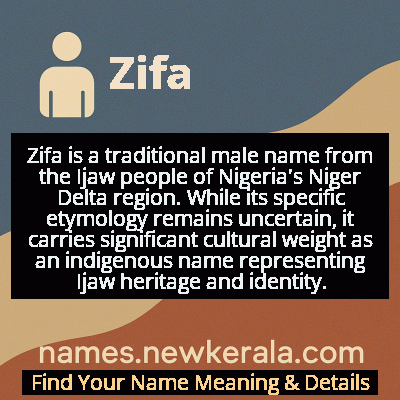Zifa Name Meaning & Details
Origin, Popularity, Numerology Analysis & Name Meaning of Zifa
Discover the origin, meaning, and cultural significance of the name ZIFA. Delve into its historical roots and explore the lasting impact it has had on communities and traditions.
Name
Zifa
Gender
Male
Origin
African
Lucky Number
6
Meaning of the Name - Zifa
Zifa is a traditional male name from the Ijaw people of Nigeria's Niger Delta region. While its specific etymology remains uncertain, it carries significant cultural weight as an indigenous name representing Ijaw heritage and identity.
Zifa - Complete Numerology Analysis
Your Numerology Number
Based on Pythagorean Numerology System
Ruling Planet
Venus
Positive Nature
Harmonious, responsible, caring, and artistic.
Negative Traits
Overly idealistic, superficial, possessive, or jealous.
Lucky Colours
Pink, turquoise.
Lucky Days
Friday.
Lucky Stones
Diamond, turquoise.
Harmony Numbers
2, 3, 9.
Best Suited Professions
Artists, musicians, teachers, healthcare workers.
What People Like About You
Warmth, nurturing nature, artistic flair.
Famous People Named Zifa
Zifa Amange
Community Leader
Renowned traditional leader and mediator in the Niger Delta region
Zifa Ogoro
Cultural Preservationist
Documented and preserved Ijaw oral traditions and naming customs
Zifa Erekosima
Educator
Established community schools promoting Ijaw language and culture
Name Variations & International Equivalents
Click on blue names to explore their detailed meanings. Gray names with will be available soon.
Cultural & Historical Significance
In Ijaw culture, names are not merely labels but vessels of identity, often given during significant ceremonies that connect the individual to their community and ancestors. The preservation of traditional names like Zifa represents resistance against cultural erosion and maintains the linguistic diversity of Nigeria's coastal regions. These names serve as markers of ethnic identity in a nation with over 250 ethnic groups, helping to maintain cultural boundaries while participating in national unity.
Extended Personality Analysis
Individuals named Zifa are often perceived as embodying traditional Ijaw values of resilience, community orientation, and quiet strength. They typically demonstrate a deep connection to their cultural roots while navigating modern challenges, showing adaptability without losing their core identity. Zifas are frequently described as dependable family members and community pillars who value tradition yet possess the wisdom to incorporate beneficial changes.
Their personality often reflects the Ijaw people's historical relationship with their environment—showing both the steady persistence of river currents and the adaptability required for survival in the challenging Niger Delta ecosystem. This combination makes them natural mediators who can bridge traditional and contemporary worlds. They tend to approach life with practical wisdom, valuing relationships and community welfare over individual achievement, while maintaining the courage to stand for their principles when necessary.
Modern Usage & Popularity
In contemporary times, Zifa maintains its status as a traditional Ijaw name primarily used within the Niger Delta region and among diaspora communities. While not among the most common Nigerian names, it has seen a resurgence as younger generations seek to reconnect with indigenous heritage. The name is predominantly used in rural and semi-urban Ijaw communities, with urban migration leading to some decline but also creating opportunities for cultural preservation through naming. Recent trends show educated Ijaw professionals increasingly choosing traditional names like Zifa for their children as statements of cultural pride and identity affirmation in multicultural Nigerian society, particularly among those working to document and revitalize endangered linguistic traditions.
Symbolic & Spiritual Meanings
Symbolically, Zifa represents the enduring spirit of Ijaw cultural identity and the preservation of indigenous knowledge systems. The name carries connotations of ancestral continuity, serving as a living link between past generations and future ones. Metaphorically, it embodies the resilience of riverine communities—adapting to changing circumstances while maintaining core cultural values. Like the Niger Delta's intricate waterways, the name suggests depth, mystery, and the life-giving sustenance of cultural traditions. It symbolizes the quiet strength found in knowing one's origins and the power of cultural memory in shaping individual and collective identity, standing as a testament to survival and cultural persistence against modernization pressures.

